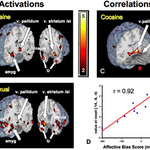
In a first-of-its-kind imaging study, Stanford University School of Medicine researchers have shown that the part of the brain that generates rewarding feelings is more activated in men than women during video-game play.
More than 230 million video and computer games were sold in 2005, and polls show that 40 percent of Americans play games on a computer or a console. According to a 2007 Harris Interactive survey, young males are two to three times more likely than females to feel addicted to video games, such as the Halo series so popular in recent years.
"These gender differences may help…
